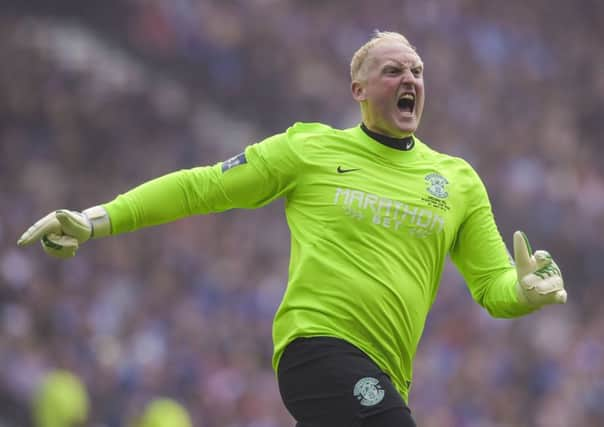Conrad Logan and the modern day football '˜legend'
This article contains affiliate links. We may earn a small commission on items purchased through this article, but that does not affect our editorial judgement.


Spend enough time on a fans forum and you’ll see a familiar debate. Either a current or, more frequently, ex-player is called a legend by one fan before another argues the point, typically using the phrase “the word legend is thrown around far too often these days”. A few others then pile on before the thread either goes cold or there’s a big enough distraction to move the conversation on.
Some players are undoubtedly legends. Lawrie Reilly is a Hibs legend. The centre forward is the club’s all-time leading goalscorer, aided in the capture of three League titles - the club has only won four - and netted 22 times for his country, making him Hibs’ highest ever scoring Scottish international. You cannot hold any Hibs player from recent years, or even recent decades, in the same regard. And yet, when Conrad Logan’s departure was confirmed from the club, player of only eight games in a Hibs goalkeeper shirt, that word popped up again: legend.
Advertisement
Hide AdAdvertisement
Hide AdThe term applies to every single member of the Hibs’ Scottish Cup-winning team. How can it not? The 114-year wait was a constant source of heartache for the Easter Road club and contributed heavily to them being the butt of jokes across Scottish football over recent years. Everyone knows of the culture that existed at Hibs. Easily defeated in derbies, haunted by several Hampden heartaches and generally considered a soft touch - something even new boss Neil Lennon alluded to when he took over the job - it was all tied into the cup drought. It became less of an incredible fact and more a living organism. Its negative energy sucking the optimism out of players, as evidenced by the continuously high turnover of talent inside the dressing room doing little to change the overbearing sense of fatalism.
Over time a few of these players will lose their legendary status. It’s the way of this fickle business. Players will leave in unceremonious circumstances, others will hit horrid runs of form, and future club success (if it occurs within this generation) will diminish the impact of May’s triumph. However, a few members of the squad will remain untouchable for generations to come: David Gray for his last-minute goal, Anthony Stokes for his vital double, Lewis Stevenson for his longevity and loyalty to the club, and perhaps even Liam Henderson for his double-assist and manic sprint into delirium as the full-time whistle blew.
Another who’ll likely retain that legend tag is Logan, someone who didn’t even have much to do in the final itself. Instead, it’s his debut against Dundee United in the semi that will live on in Hibs’ history.
It’s a credit to the arbitrary nature of football that Hibs could put in such contrasting performances five weeks apart. No one would have looked at their display against almost-relegated United and foresaw them defeating the same Rangers side that would humble Celtic at the same venue 24 hours later. Make no mistake about it, without Logan there is no famous Scottish Cup win. The semi would have been regarded as nothing more than another near-miss in a campaign full of them. Hibs controlled possession, but United created the much better chances outside of Jason Cummings’ infamous paneka penalty. Logan denied three one-on-ones, made a low reflex shot down to his left later in the match and topped it off by repelling United’s first two kicks of the penalty shoot-out. The situation became almost bizarre. Who was this guy and why was it impossible to get the ball past him? Paul Dixon eventually broke through but the damage had been done. Logan, a man who Hibs supporters would have been unable to pick out of a line up prior to kick-off, and been the source of mirth throughout the match for his unconditioned and highly unusual physique by modern standards, was suddenly the talk of the nation.
It’s the nature of football these days, particularly in Scotland, that legends can be made in such a small time period. Such status used to be reserved for those who were beloved by supporters over a series of years, usually collecting a number of trophies in the process. Simply, it’s not how things work any more. A footballer’s career is typically nomadic. Do we resist adding modern heroes to the legends of past years? Or do we adapt to the times in which we live and celebrate their legacies even if they were here and gone in a condensed time frame?
Logan would initially see the gloves go back to regular starter Mark Oxley before taking them for the rest of the campaign after Oxley dropped a clanger against Rangers in a league match. Logan would never repeat the United performance and even made a grave error in the first leg of the play-off semi-final with Falkirk that likely went a long way to denying Hibs a chance at promotion. For that reason, perhaps his recent departure secures his legacy. It cannot be tarnished by future mistakes. His legendary status is frozen in time.
DOWNLOAD THE SCOTSMAN APP ON ITUNES OR GOOGLE PLAY